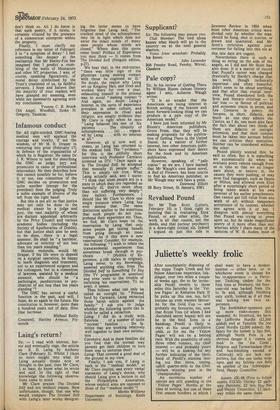Laing's return?
Sir, — I read with interest, horror and eventually rage, the article on R. D. Laing by Anthony Clare (February 3). Whilst I claim no more insight into what Dr Laing actually thinks now or thought in the past, than Mr Clare, I, at least, do know what he wrote and said. In the light of that knowledge the following observations come to mind.
Mr Clare praises The Divided Self and not without reason. How unfortunate, though, that one who would compare The Divided Self with Laing's later works denigrat
ing the latter seems to have forgotten that Laing said, "The cracked mind of the schizophrenic may let in light which does not enter the intact minds of many sane people whose minds are closed." Where does this quote come from? Politics of Experience you may think — It comes from The Divided Self (Penguin edition, p.27). We hear that, in the mid-sixties, " there was little sign of the physician Laing making contact with those he cognised as ill." No doubt, the reason why Laing set up Kingsley Hall, and lived and worked there for over a year, exhausting himself in the process was to avoid "making contact "?
And again, no doubt Laing's interest in the sorts of experience prevalent in other culture, and their expression in ritual and religion, are simply evidence that Mr Clare is right when he says "Laing behaved like one of his patients . . . The ubiquity of schizophrenia . . . (is) . . . regarded by Laing • . with no interest at all."
However, all is' now well it seems, as Laing has returned to the medical fold. The " evidence" for this is the pitifully short interview with Professor Carstairs screened on ITV. "Once again as in The Divided Self, he accepted that mentally ill people suffer." This is simply not true. What Laing actually said, and I quote: " I think that when people are in a state in which they are regarded as mentally ill, they're more often than not suffering very deeply" (my italics). Furthermore, I should like Mr Clare to show one single instance where Laing has ever denied that. The same distinction applies to the assertions that such people do not comprehend their experience etc. Then, we find, Mr Clare leaps on the reservation by Laing that only some people get lasting benefit from going through an inner voyage. As if this were a new reservation! Consider, for example, the following: "I wish to relate the transcendental experiences that sometimes break through in psychosis . . ." (Politics of Experience, p.108 italics in original). Laing never, to my knowledge, asserted anything else, from The Divided Self to Something To Say (the TV programme in question) and even went to the trouble of italicising his reservations. To no avail, it seems. Then follows what can only be called an outright lie. " Pressed hard by Carstairs, Laing retracted those harsh edicts against the family." I ask you to judge whether the following quote can in truth be called a retraction.
Laing: I did do a study with Esterson . . • of a number of quite " normal " families . . . the families that are working relatively well together to their own satisfaction . . . .
Cairstairs: And in these families did you find that the normal way parents get their children to love them was to terrorise then? Laing: That covered a good deal of the ground in my view. Finally, I ask you, if Laing is back in the "medical model," as Mr Clare implies, and every verbal statement of Laing's denies, why should Laing give a lecture to aid the Philadelphia Association, whose explicit aims are opposed to those of the " medical model "?
Martin Williams Department of Sociology, Keele University.


































 Previous page
Previous page